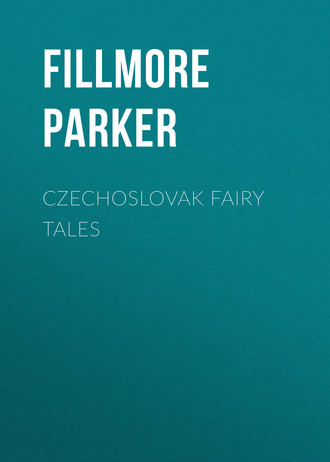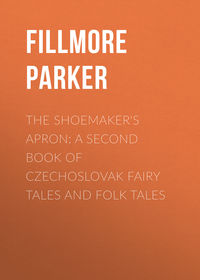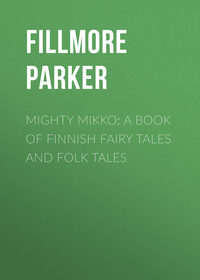 полная версия
полная версияCzechoslovak Fairy Tales
It seems that the devil himself had come and before their very eyes had carried off his wife and mother-in-law. They looked at each other in amazement as Dobromil rode up with what seemed to be the same wife whom the devil had so recently carried off.
Dobromil explained to them what had happened and with one voice they called down punishment on the head of the wicked sister.
The golden spinning wheel had vanished. So Dobrunka hunted out her old one and set to work at once to spin for her husband’s shirts. No one in the kingdom had such fine shirts as Dobromil and no one was happier.
THE GOLDEN GODMOTHER
THE STORY OF POOR LUKASTHE GOLDEN GODMOTHERTHERE was once a wealthy farmer named Lukas who was so careless in the management of his affairs that there came a time when all his property was gone and he had nothing left but one old tumble-down cottage. Then when it was too late he realized how foolish he had been.
He had always prayed for a child but during the years of his prosperity God had never heard him. Now when he was so poor that he had nothing to eat, his wife gave birth to a little daughter. He looked at the poor unwelcome little stranger and sighed, for he didn’t know how he was going to take care of it.
The first thing to be thought about was the christening. Lukas went to the wife of a laborer who lived nearby and asked her to be godmother. She refused because she didn’t see that it would do her any good to be godmother to a child of a man as poor as Lukas.
“You see, Lukas, what happens to a man who has wasted his property,” his wife said. “While we were rich the burgomaster himself was our friend, but now even that poverty-stricken woman won’t raise a finger to help us… See how the poor infant shivers, for I haven’t even any old rags in which to wrap it! And it has to lie on the bare straw! God have mercy on us, how poor we are!” So she wept over the baby, covering it with tears and kisses.
Suddenly a happy thought came to her. She wiped away her tears and said to her husband:
“I beg you, Lukas, go to our old neighbor, the burgomaster’s wife. She is wealthy. I’m sure she hasn’t forgotten that I was godmother to her child. Go and ask her if she will be godmother to mine.”
“I don’t think she will,” Lukas answered, “but I’ll ask her.”
With a heavy heart he went by the fields and the barns that had once been his own and entered the house of his old friend, the burgomaster.
“God bless you, neighbor,” he said to the burgomaster’s wife. “My wife sends her greeting and bids me tell you that God has given us a little daughter whom she wants you to hold at the christening.”
The burgomaster’s wife looked at him and laughed in his face.
“My dear Lukas, of course I should like to do this for you, but times are hard. Nowadays a person needs every penny and it would take a good deal to help such poor beggars as you. Why don’t you ask some one else? Why have you picked me out?”
“Because my wife was godmother to your child.”
“Oh, that’s it, is it? What you did for me at that time was a loan, was it? And now you want me to give you back as much as you gave me, eh? I’ll do no such thing! If I were as generous as you used to be, I’d soon go the way you have gone. No! I shall not walk one step toward that christening!”
Without answering her, Lukas turned and went home in tears.
“You see, dear wife,” he said when he got there, “it turned out as I knew it would. But don’t be discouraged, for God never entirely forsakes any one. Give me the child and I myself will carry it to the christening and the first person I meet I shall take for godmother.”
Weeping all the while, the wife wrapped the baby in a piece of old skirt and placed it in her husband’s arms.
On the way to the chapel, Lukas came to a crossroads where he met an old woman.
“Grandmother,” he said, “will you be godmother to my child?” And he explained to her how every one else had refused on account of his poverty and how in desperation he had decided to ask the first person he met. “And so, dear grandmother,” he concluded, “I am asking you.”
“Of course I’ll be godmother,” the old woman said. “Here, give me the dear wee thing!”
So Lukas gave her the child and together they went on to the chapel.
As they arrived the priest was just ready to leave. The sexton hurried up to him and whispered that a christening party was coming.
“Who is it?” he asked, impatiently.
“Oh, it’s only that good-for-nothing of a Lukas who is poorer than a church mouse.”
The godmother saw that the sexton was whispering something unfriendly, so she pulled out a shining ducat from her pocket, stepped up to the priest, and pressed it into his hand.
The priest blinked his eyes in amazement, looking first at the ducat and then at the shabby old woman who had given it. He stuffed the ducat into his pocket, whispered hurriedly to the sexton to bring him the font, and then christened the child of poor Lukas with as much ceremony as the child of the richest townsman. The little girl received the name Marishka.
After the christening the priest accompanied the godmother to the door of the chapel and the sexton went even farther until he, too, received the reward for which he was hoping.
When Lukas and the old woman came to the crossroads where they had met, she handed him the child. Then she reached into her pocket, drew out another golden ducat which she stuck into a fold of the child’s clothes, and said: “From this ducat with which I endow my godchild, you will have enough to bring her up properly. She will always be a joy and a comfort to you, and when she grows up she will make a happy marriage. Now good-by.”
She drew a green wand from her bosom and touched the earth. Instantly a lovely rosebush appeared, covered with blooms. At the same moment the old woman vanished.
In bewilderment Lukas looked this way and that but she was gone. He was so surprised that he didn’t know what had happened. I really think he would be standing on that same spot to this day if little Marishka had not begun to cry and by this reminded him of home.
His wife, meantime, was anxiously awaiting him. She, poor soul, was suffering the pangs of hunger, thirst, and bodily pain. There wasn’t a mouthful of bread in the house, nor a cent of money.
As Lukas entered the room, he said: “Weep no more, dear wife. Here is your little Marishka. But before you kiss the child, take out the christening gift that you will find tucked away in her clothes. From it you will know what an excellent godmother she has.”
The wife reached into the clothes and pulled out not one ducat but a whole handful of ducats!
“Oh!” she gasped and in her surprise she dropped the ducats and they rolled about in the straw that littered the wretched floor.
“Husband! Husband! Who gave you so much money? Just look!”
“I have already looked and at first when I saw them I was more surprised than you are. Now let me tell you where they come from.”
So Lukas related to his wife all that had happened at the christening. In conclusion he said: “When I saw the old woman was really gone, I started home. On the way curiosity overcame me and I drew out the christening present and instead of one ducat I found a handful. I can tell you I was surprised but instead of letting them drop on the ground I let them slip back into the baby’s clothes. I said to myself: ‘Let your wife also have the pleasure of pulling out those golden horses.’ And now, dear wife, leave off exclaiming. Give thanks to God for that which he has bestowed upon us and help me gather up the golden darlings, for we don’t want any one coming in and spying on us just now.”
As they began picking them up, they had a new surprise. Wherever there was one ducat, there they found ten! When they got them all together they made a fine big heap.
“Oh, dear, oh, dear!” said the woman as she gazed at the pile. “Who knows whether this money will be blessed to our use? Perhaps that old woman was an evil spirit who just wants to buy our souls!”
Lukas looked at his wife reprovingly. “How can you be so foolish? Do you suppose an evil spirit would have gone with me to church, allowed herself to be sprinkled with holy water, yes, and even herself make the sign of the cross! Never! I don’t say that she is just an ordinary human being, but I do say that she must be a good spirit whom God has sent to us to help us. I’m sure we can keep this money with a clear conscience. The first question is where to hide it so that no one can find it. For the present I shall put it into the chest, but tomorrow night I shall bury it under the pear tree. And one thing, wife, I warn you: don’t say anything about it to any one. I shall take one ducat and go to the burgomaster’s wife and ask her to change it. Then I shall go buy some milk and eggs and bread and flour, and I’ll bring back a woman with me who will make us a fine supper. Tomorrow I’ll go to town and buy some clothes and feather beds. After that what else shall I buy? Can you guess?”
“The best thing to do would be to buy back our old property – the house, the fields, and the live stock, and then manage it more wisely than before.”
“You’re right, wife, that’s just what I’ll do. And I will manage prudently this time! I have learned my lesson, I can tell you, for poverty is a good teacher.”
When Lukas had hidden the money in the chest and turned the key, he took one ducat and went out to make his purchases. While he was gone his wife spent the time nursing the child and weaving happy dreams that now, she was sure, would come to pass.
After a short hour the door opened and Lukas and a red-cheeked maid entered. The maid carried a great pail of foaming milk. Lukas followed her with a basket of eggs in one hand and on top of the eggs two big round brown cakes, and in the other hand a load of feather beds tied in a knot.
“God be with you!” said the maid, placing the milk pail on the bench. “My mistress, the burgomaster’s wife, greets you and sends you some milk for pudding. If there is anything else you need you are to let her know.” The maid curtsied and went away before the poor woman could express her thanks.
Lukas laughed and said: “You see, wife, what just one ducat did! If they knew how many more we had they would carry us about in their arms! The burgomaster’s wife has sent us all these things. She is lending us feather beds until tomorrow and she is going to send us an old woman to help us out. I told her our child had received a handful of ducats as a christening gift. If she comes here to see you, make up your mind what you’re going to say.”
Then Lukas built a fire. Presently the old woman came and soon good hot soup was ready. It was just plain milk soup, but I can tell you it tasted better to hungry Lukas and his wife than the rich food which the king himself ate that day from a golden platter.
The next day after breakfast Lukas set out for town. The burgomaster’s wife took advantage of his absence to visit his wife and find out what she could about the money.
“My dear neighbor,” she said, after she had made the necessary inquiries about health, “the blessing of God came into your house with that child.”
“Oh,” said the other, “if you mean the christening gift, it isn’t so very much. A handful of ducats soon roll away. However, may God repay that good woman, the godmother. At least we can now buy back our old farm and live like respectable people.”
On the way home the burgomaster’s wife stopped at the houses of her various friends and gave them a full account of Lukas’ wealth. Before noon every small boy in the village knew that at Lukas’ house they had a hogshead of ducats.
In the evening Lukas came back from town driving a cart that was piled high with furniture and clothing and feather beds and food. The next day he bought back his old farm with the cattle and the implements.
This marked the beginning of a new life for Lukas. He set to work with industry and put into practice all the lessons that poverty had taught him.
He and his wife lived happily. Their greatest joy was Marishka, a little girl so charming and so pretty that every one loved her on sight.
“Dear neighbor,” all the old women used to say to the child’s mother, “that girl of yours will never grow up. She’s far too wise for her years!”
But Marishka did very well. She grew up into a beautiful young woman and one day a prince saw her, fell in love with her, and married her. So the old godmother’s prophecy that Marishka would make a happy marriage was fulfilled.
THE GOLDEN DUCK
THE STORY OF PRINCE RADUZ AND THE FAITHFUL LUDMILATHE GOLDEN DUCKONCE upon a time there was a king who had four sons. One day the queen said to him:
“It is time that one of our boys went out into the world to make his fortune.”
“I have been thinking that very same thing,” the king said. “Let us get ready Raduz, our youngest, and send him off with God’s blessing.”
Preparations were at once made and in a few days Raduz bid his parents farewell and set forth.
He traveled many days and many nights over desert plains and through dense forests until he came to a high mountain. Halfway up the mountain he found a house.
“I’ll stop here,” he thought to himself, “and see if they’ll take me into service.”
Now this house was occupied by three people: old Yezibaba, who was a bad old witch; her husband, who was a wizard but not so bad as Yezibaba; and their daughter, Ludmila, the sweetest, kindest girl that two wicked parents ever had.
“Good day to you all,” Raduz said, as he stepped into the house and bowed.
“The same to you,” old Yezibaba answered. “What brings you here?”
“I’m looking for work and I thought you might have something for me to do.”
“What can you do?” Yezibaba asked.
“I’ll do anything you set me to. I’m trustworthy and industrious.”
Yezibaba didn’t want to take him, but the old man wanted him and in the end Yezibaba with very ill grace consented to give him a trial.
He rested that night and early next morning presented himself to the old witch and said:
“What work am I to do today, mistress?”
Yezibaba looked him over from head to foot. Then she took him to a window and said: “What do you see out there?”
“I see a rocky hillside.”
“Good. Go to that rocky hillside, cultivate it, plant it in trees that will grow, blossom, and bear fruit tonight. Tomorrow morning bring me the ripe fruit. Here is a wooden hoe with which to work.”
“Alas,” thought Raduz to himself, “did ever a man have such a task as this? What can I do on that rocky hillside with a wooden hoe? How can I finish my task in so short a time?”
He started to work but he hadn’t struck three blows with the wooden hoe before it broke. In despair he tossed it aside and sat down under a beech tree.
In the meantime wicked old Yezibaba had cooked a disgusting mess of toads which she told Ludmila to carry out to the serving man for his dinner. Ludmila was sorry for the poor young man who had fallen into her mother’s clutches and she said to herself: “What has he done to deserve such unkind treatment? I won’t let him eat this nasty mess. I’ll share my own dinner with him.”
She waited until her mother was out of the room, then she took Yezibaba’s magic wand and hid it under her apron. After that she hurried out to Raduz, whom she found sitting under the beech tree with his face in his hands.
“Don’t be discouraged,” she said to him. “It is true your mistress cooked you a mess of toads for your dinner but, see, I have thrown them away and have brought you my own dinner instead. As for your task,” she continued, “I will help you with that. Here is my mother’s magic wand. I have but to strike the rocky hillside and by tomorrow the trees that my mother has ordered will spring up, blossom, and bear fruit.”
Ludmila did as she promised. She struck the ground with the magic wand and instantly instead of the rocky hillside there appeared an orchard with rows on rows of trees that blossomed and bore fruit as you watched them.
Raduz looked from Ludmila to the orchard and couldn’t find words with which to express his surprise and gratitude. Then Ludmila spread out her dinner and together they ate it, laughing merrily and talking. Raduz would have kept Ludmila all the afternoon but she remembered that Yezibaba was waiting for her and she hurried away.
The next morning Raduz presented Yezibaba a basket of ripe fruit. She sniffed it suspiciously and then very grudgingly acknowledged that he had accomplished his task.
“What am I to do today?” Raduz asked.
Yezibaba led him to a second window and asked him what he saw there.
“I see a rocky ravine covered with brambles,” he said.
“Right. Go now and clear away the brambles, dig up the ravine, and plant it in grape vines. Tomorrow morning bring me the ripe grapes. Here is another wooden hoe with which to work.”
Raduz took the hoe and set to work manfully. At the first blow the hoe broke into three pieces.
“Alas,” he thought, “what is going to happen to me now? Unless Ludmila helps me again, I am lost.”
At home Yezibaba was busy cooking a mess of serpents. When noonday came she said to Ludmila: “Here, my child, is dinner for the serving man. Take it out to him.”
Ludmila took the nasty mess and, as on the day before, threw it away. Then again hiding Yezibaba’s wand under her apron, she went to Raduz, carrying in her hands her own dinner.
Raduz saw her coming and at once his heart grew light and he thought to himself how kind Ludmila was and how beautiful.
“I have been sitting here idle,” he told her, “for at the first blow my hoe broke. Unless you help me, I don’t know what I shall do.”
“Don’t worry,” Ludmila said. “It is true your mistress sent you a mess of serpents for your dinner, but I threw them out and have brought you my own dinner instead. And I’ve brought the magic wand, too, so it will be easy enough to plant a vineyard that will produce ripe grapes by tomorrow morning.”
They ate together and after dinner Ludmila took the wand and struck the earth. At once a vineyard appeared and, as they watched, the vines blossomed and the blooms turned to grapes.
It was harder than before for Raduz to let Ludmila go, for he wanted to keep on talking to her forever, but she remembered that Yezibaba was waiting for her and she hurried away.
The next morning when Raduz presented a basket of ripe grapes, old Yezibaba could scarcely believe her eyes. She sniffed the grapes suspiciously and then very grudgingly acknowledged that he had accomplished his second task.
“What am I to do today?” Raduz asked.
Yezibaba led him to a third window and told him to look out and tell her what he saw.
“I see a great rocky cliff.”
“Right,” she said. “Go now to that cliff and grind me flour out of the rocks and from the flour bake me bread. Tomorrow morning bring me the fresh loaves. Today you shall have no tools of any kind. Go now and do this task or suffer the consequences.”
As Raduz started off, Yezibaba looked after him and shook her head suspiciously.
“I don’t understand this,” she said to her husband. “He could never have done these two tasks alone. Do you suppose Ludmila has been helping him? I’ll punish her if she has!”
“Shame on you,” the old man said, “to talk so of your own daughter! Ludmila is a good girl and has always been loyal and obedient.”
“I hope so,” Yezibaba said, “but just the same I think I myself will carry him out his dinner today.”
“Nonsense, old woman! You’ll do no such thing! You’re always smelling a rat somewhere! Let the boy alone and don’t go nagging at Ludmila either!”
So Yezibaba said no more. This time she cooked a mess of lizards for Raduz’ dinner.
“Here, Ludmila,” she said, “carry this out to the young man. But see that you don’t talk to him. And hurry back.”
Poor Raduz had been pounding stones one on another as well as he could, but he hadn’t been able to grind any of them into flour. As noonday approached he kept looking up anxiously to see whether beautiful Ludmila was again coming to help him.
“Here I am,” she called while she was yet some distance away. “You were to have lizard stew today but, see, I am bringing you my own dinner!”
Then she told him what she had heard Yezibaba say to her father.
“Today she almost brought you your dinner herself, for she suspects that I have been helping you. If she knew that I really had she would kill you.”
“Dear Ludmila,” Raduz said, “I know very well that without you I am lost! How can I ever thank you for all you have done for me?”
Ludmila said she didn’t want thanks. She was helping Raduz because she was sorry for him and loved him.
Then she took Yezibaba’s wand and struck the rocky cliff. At once, instead of the bare rock, there were sacks of grain and a millstone that worked merrily away grinding out fine flour. As you watched, the flour was kneaded up into loaves and then, pop went the loaves into a hot oven and soon the air was sweet with the smell of baking bread.
Raduz begged Ludmila to stay and talk to him, but she remembered that the old witch was waiting for her and she hurried home.
The next morning Raduz carried the baked loaves to Yezibaba. She sniffed at them suspiciously and then her wicked heart nearly cracked with bitterness to think that Raduz had accomplished his third task. But she hid her disappointment and pretending to smile, she said:
“I see, my dear boy, that you have been able to do all the tasks that I have set you. This is enough for the present. Today you may rest.”
That night the old witch hatched the plot of boiling Raduz alive. She had him fill a big cauldron with water and put it on the fire. Then she said to her husband:
“Now, old man, I’m going to take a nap but when the water boils wake me up.”
As soon as Yezibaba was asleep Ludmila gave the old man strong wine until he, too, fell asleep. Then she called Raduz and told him what Yezibaba was planning to do.
“You must escape while you can,” she said, “for if you are here tomorrow you will surely be thrown into the boiling cauldron.”
But Raduz had fallen too deeply in love with Ludmila to leave her and now he declared that he would never go unless she went with him.
“Very well,” Ludmila said, “I will go with you if you swear you will never forget me.”
“Forget you? How could I forget you,” Raduz said, “when I wouldn’t give you up for the whole world!”
So Raduz took a solemn oath and they made ready to flee. Ludmila threw down her kerchief in one corner of the house and Raduz’ cap in another. Then she took Yezibaba’s wand and off they started.
The next morning when the old man awoke, he called out: “Hi, there, boy! Are you still asleep?”
“No, I’m not asleep,” answered Raduz’ cap. “I’m just stretching.”
Presently the old man called out again: “Here, boy, hand me my clothes.”
“In a minute,” the cap answered. “Just wait till I put on my slippers.”
Then old Yezibaba awoke. “Ludmila!” she cried. “Get up, you lazy girl, and hand me my skirt and bodice.”
“In a minute! In a minute!” the kerchief answered.
“What’s the matter?” Yezibaba scolded. “Why are you so long dressing?”
“Just one more minute!” the kerchief said.
But Yezibaba, who was an impatient old witch, sat up in bed and then she could see that Ludmila’s bed was empty. That threw her into a fine rage and she called out to her husband:
“Now, old man, what have you got to say? As sure as I’m alive that good-for-nothing boy is gone and that precious daughter of yours has gone with him!”
“No, no,” the old man said. “I don’t think so.”
Then they both got up and sure enough neither Raduz nor Ludmila was to be found.
“What do you think now, you old booby!” Yezibaba shouted. “A mighty good and loyal and obedient girl that daughter of yours is! But why do you stand there all day? Mount the black steed and fly after them and when you overtake them bring them back to me and I’ll punish them properly!”
In the meantime Raduz and Ludmila were fleeing as fast as they could.
Suddenly Ludmila said: “Oh, how my left cheek burns! I wonder what it means? Look back, dear Raduz, and see if there is any one following us.”
Raduz turned and looked. “There’s nothing following us,” he said, “but a black cloud in the sky.”
“A black cloud? That’s the old man on the black horse that rides on the clouds. Quick! We must be ready for him!”






